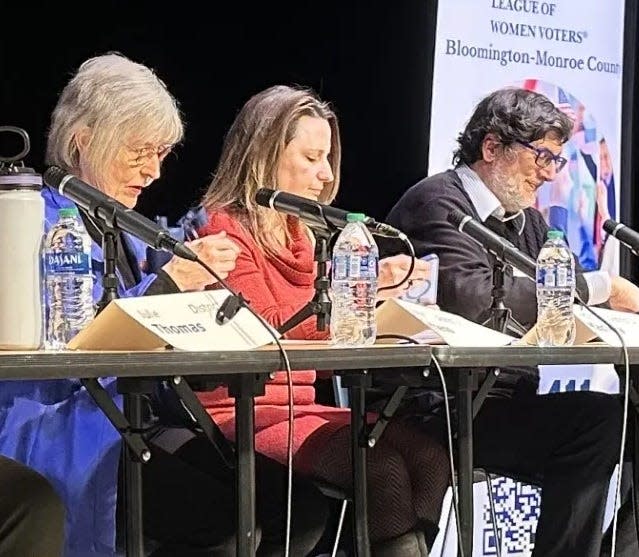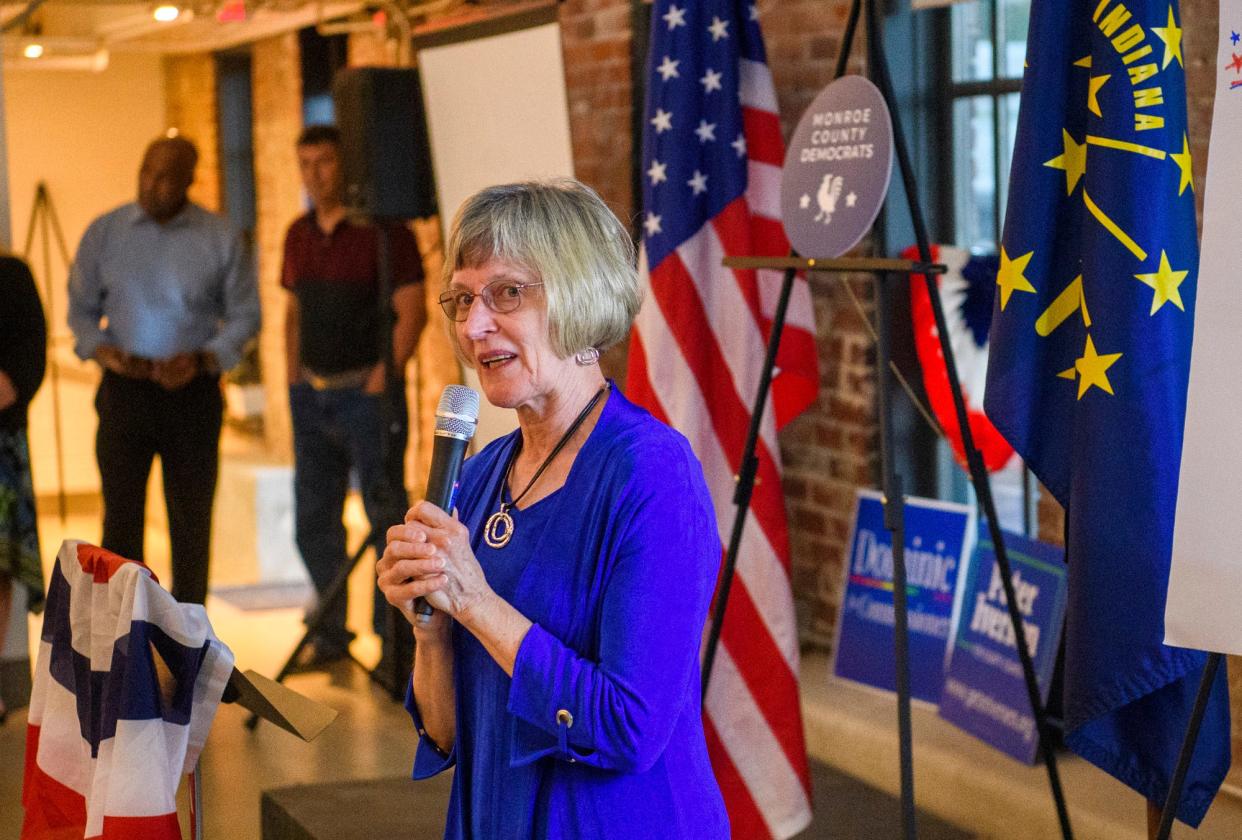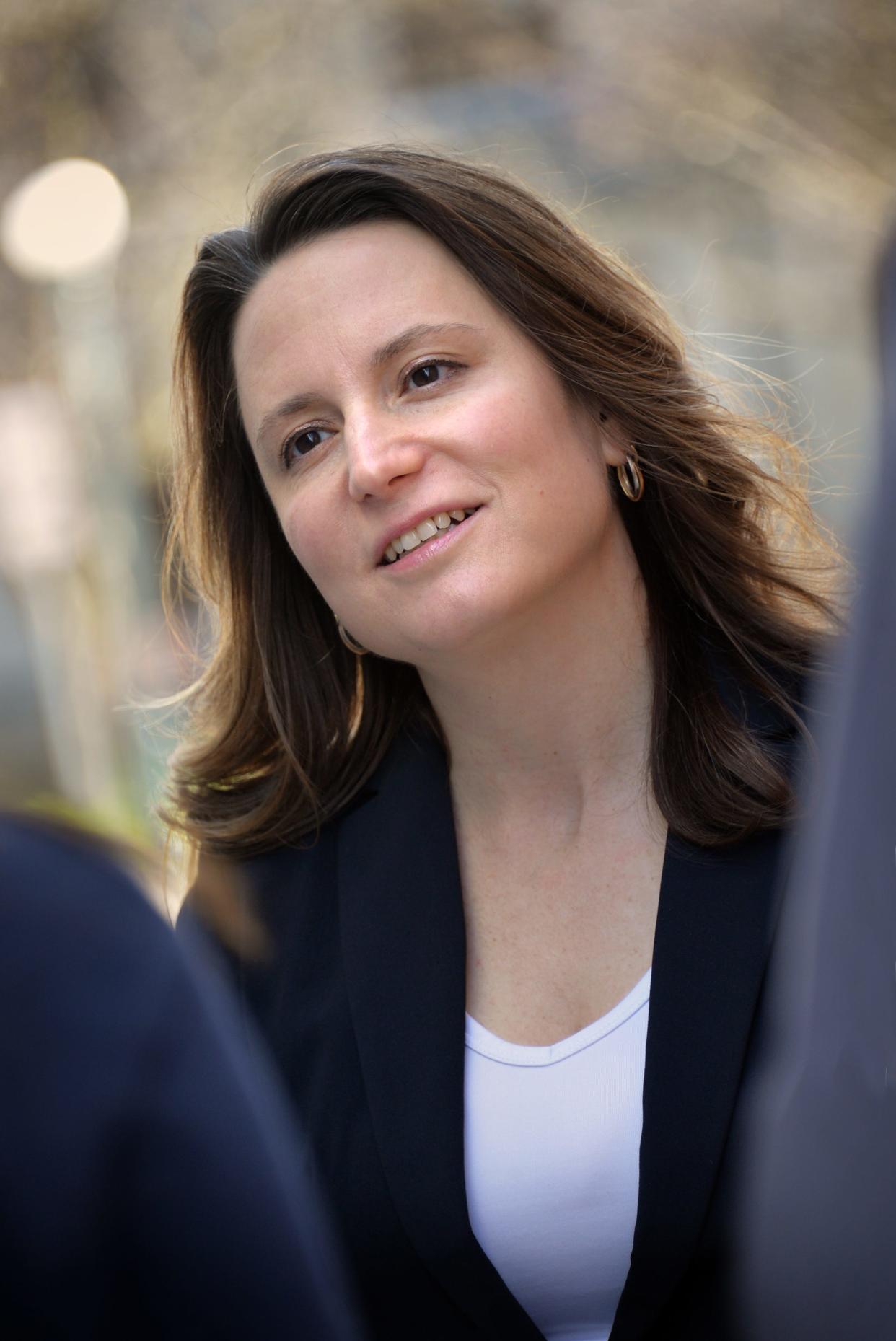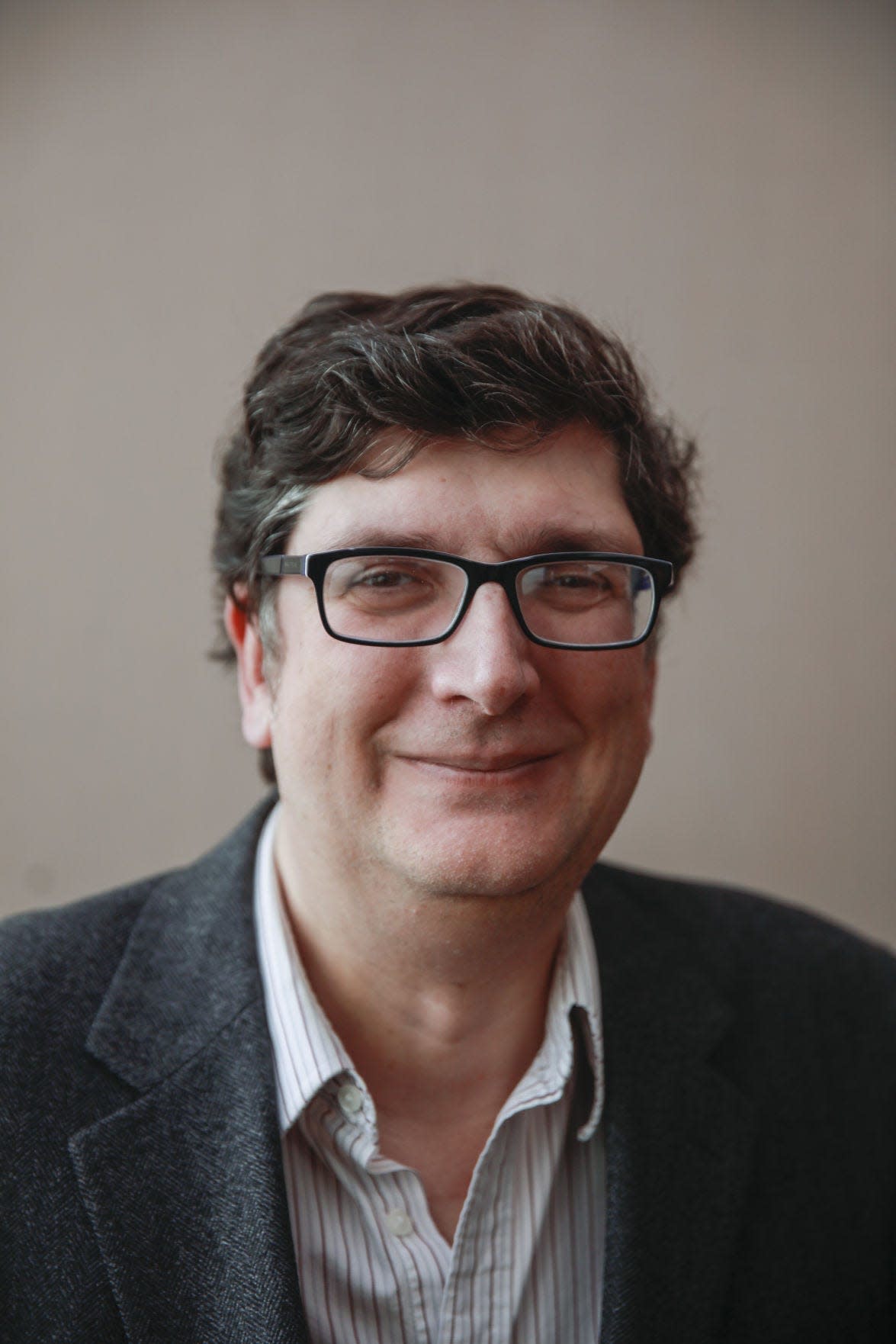What commissioner candidates Githens, Volan, Madeira say about housing, jail, annexation

Monroe County commissioner Penny Githens is facing two challengers in this year’s Democratic Party primary, and the winner will face a Republican opponent in the fall.
Githens is seeking re-election, but has to first withstand primary challenges from Jody Madeira and Steve Volan.
The three are vying for the Democratic Party nomination for District 3, though all Monroe County voters will get to weigh in so long as they choose the Democratic Party ballot in the primary.
Competitive: Monroe County commissioners, council members to face primary challengers
Monroe County voters who choose the Republican Party ballot will decide which Republican — Joe Van Deventer or Paul White Sr. — will face the winner of the Democratic primary in November.
Candidates are listed in alphabetical order by last name.

Name: Penny Githens
Date of birth: 11-12-1949
Family (marital status/children): Married to Ed Buffie; two sons, Nathan and Nick
How long have you lived in Monroe County: 32 years
Occupation: Monroe County Commissioner
Education: BS in chemistry and math education, Purdue; MS in educational psychology, IU
Question 1: Why are you running for commissioner? What would you bring to the job that your opponents wouldn’t?
Githens: I’m running for commissioner because I care. I care about clean water in Lake Monroe, increasing the availability of childcare, what the new jail and justice campus will look like and where they will be located, how opioid settlement money will be spent, treatment for those with mental illness and substance use disorders, bringing the Integrated Reentry and Correctional Supports program to Monroe County, increasing recovery housing, improving stormwater drainage, protecting our beautiful natural resources, expanding our convention center, increasing housing options, extending our county trails, supporting our local food bank and food pantries, making homelessness rare, brief and non-repeating, and modernizing the Monroe County Airport. This is not a complete list, but it includes some of the things I have worked on. What distinguishes me from my opponents is my 5 years of experience as a county commissioner and my full-time devotion to this job.
Q2: Property tax bills, home prices and rents have been rising sharply in the last few years. For what concrete policies would you advocate to address these challenges in the short term?
Githens: This is, quite simply, an issue of supply and demand. Last year approximately 3,000 new apartments came on-line in Monroe County, with more scheduled this year. There is some softening of the rental market, which should lead to a more competitive situation. The proposed new housing in the Sudbury and Hopewell neighborhoods should also help.
Currently CBU is refusing to provide sewer hook-ups outside City limits. This is making it harder to build new housing in the non-urban parts of Monroe County, especially “attainable” housing. People can continue to build outside of City limits, but they will need at least a 1-acre lot in order to install a septic system.
Locally, it’s the assessed property value, not the tax rate, which has been increasing. And, it is the State Board of Accounts which sets the annual tax levy, not the Board of Commissioners or the County Council.
Q3: If you were faced with a decision to allow home construction on the city’s fringe, how would you balance the interest of existing homeowners, developers, and future residents?
Githens: Unless another entity is available to provide sewer service, this is currently a moot issue as I indicated in my answer to Question 2. However, I would work with the County’s Plan Commission, Planning Department, and Stormwater and Highway Departments, and I would take into account input from existing homeowners, developers, and local employers in making decisions about home construction in the city’s fringe. This is the process I followed when voting to approve the Westgate apartment complex being on West 3rd Street, which will provide 330 apartment homes.
Q4: The community has long been discussing replacing the current jail. Do you think it should be built in the city or outside of it? Why?
Githens: I have toured jails, gone through training provided by the National Corrections Institute, and been involved in discussions with our design firm and Sheriff Marté. I agree with the Sheriff that a new jail should be single story and include much more space for programming, recreation, medical treatment, and training, which means the new jail will have a much larger footprint than the current one. Safety demands co-locating our local justice system with the new jail. To do all this, we need a 25-acre site. For more than a year, we have tried unsuccessfully to identify 25 acres within the city. Building on the Thomson site would require moving high-power electricity lines and a multi-acre debris mound which would delay building by at least two years. There is not only a financial cost, but a human cost to this delay, so the only option is to build outside the city.
Q5: An annexation-related trial is scheduled to begin at the end of April. Do you think areas 1A and 1B, on the city’s west side, should be annexed? Why or why not?
Githens: A majority of the property owners in areas 1A and 1B have expressed their opposition to being annexed, and I respect their wishes. Given that this is being litigated in court, I do not think it is proper for me to say anything further.

Name: Jody Madeira
Date of birth: 10/19/76
Family (marital status/children): Married with children
How long have you lived in Monroe County: Since Dec. 2007
Occupation: Law professor, Indiana University
Education: BA/BS Millersville University of Pennsylvania, English/Communication Studies, MS Georgetown University Sociolinguistics, JD University of Pennsylvania Law School, Ph.D. Annenberg School for Communication, University of Pennsylvania
Q1: Why are you running for commissioner? What would you bring to the job that your opponents wouldn’t?
Madeira: In 2022, I considered running for House District 62, but decided on local office after conversations with residents. I can govern more collaboratively and inclusively. Here are key differences between opponents and me:
At IU, students and peers constantly evaluate my teaching and writing, improving me professionally and personally.
I’m a tireless community advocate; from 2019-2024, I’ve worked with victims to pass 11 state laws outlawing fertility fraud (when physicians used their own samples to inseminate women without knowledge/consent). I staunchly opposed IN’s abortion ban.
I welcome criticism and seek diverse perspectives in decision-making; current commissioners avoid being challenged (disbanding the Community Justice Response Committee).
I have legal expertise, a tremendous work ethic, and implement data-driven solutions.
I value listening, compromise, transparency, and respect for residents and other government branches.
I prioritize community input; commissioners should meet when citizens are available, not 10 a.m.
Q2: Property tax bills, home prices and rents have been rising sharply in the last few years. For what concrete policies would you advocate to address these challenges in the short term?
Madeira: For short term relief, I support measures like temporary freezes/caps on increases for homeowners’ property taxes to provide predictability and prevent sudden tax bill spikes. I also favor relief programs for low-income homeowners, seniors, and individuals on fixed incomes. I would promote incentives for energy-efficient home improvements and deferred/flexible payment plans. After conducting an urgently needed housing needs assessment, I would incentivize employer-sponsored housing and rapid construction of low- and middle-income housing through public-private partnerships, streamline permit/approval processes, regulate short-term rentals, and enact zoning reform (including revising the Comprehensive Plan/County Development Ordinance to allow for greater density and mixed-use development). Expanding rental vouchers and rent stabilization policies mitigates rising rents just as higher taxes on vacant properties encourages occupancy. Community land trusts can help finance affordable housing development. These policies ameliorate the short-term effects of rising taxes, home prices and rents and provide frameworks for long-term solutions.
Q3: If you were faced with a decision to allow home construction on the city’s fringe, how would you balance the interest of existing homeowners, developers and future residents?
Madeira: This task requires nuanced approaches. I disagree with the current commissioners’ anti-development mindset that dictates low-density housing; that is economically and environmentally harmful. I would prioritize community engagement, listening to all stakeholders (including residents and neighborhood associations) to understand concerns and goals, ensuring that development meets the needs of current and future residents. I would support zoning regulations that preserve the character of existing neighborhoods, homeowners’ quality-of-life, and green spaces while accommodating sustainable new development. Developers should use environmentally sound building practices and contribute to infrastructure improvements to alleviate strain on existing resources. Commissioners should streamline permitting processes and never turn down developments for aesthetic reasons (being “too similar”); evidence-based and transparent decision-making is critical. Investing in infrastructure such as broadband during development enhances community well-being. I would strike a balance between mitigating disruptions for homeowners, ensuring equitable housing access for future residents, and requiring responsible development that enhances community livability.
Q4: The community has long been discussing replacing the current jail. Do you think it should be built in the city or outside of it? Why?
Madeira: The current jail is a community embarrassment, a human rights debacle, and the subject of a 15-year old ACLU lawsuit; yet, the current commissioners still have “communication breakdowns” with Sheriff Ruben Marté and have not moved forward. The decision to build inside or outside the city depends on logistical, social, and economic considerations. While building the jail closer to downtown strengthens inmates’ support networks, constructing the jail farther from the downtown poses transportation logistics problems for inmates, staff, and visitors.
I support a justice center as close to the downtown as possible, with extensive public transit. The jail should be one story (offices could be on higher floors), co-located with prosecutor, public defender, judicial offices, technologically updated courtrooms, and mental health and substance use recovery services. Finding a larger space may be a problem in the downtown, but we cannot safely release people in a cornfield by a public highway.
Q5: An annexation-related trial is scheduled to begin at the end of April. Do you think areas 1A and 1B, on the city’s west side, should be annexed? Why or why not?
Madeira: Annexation is a complex decision that requires weighing municipal needs with residents’ interests in the area(s) to be annexed. Residents were concerned about the annexation’s scope and speed. Petitioners in 1A and 1B obtained over 51% of remonstration signatures needed to legally appeal the annexation; for these areas, Bloomington relinquished claims that Indiana enacted unconstitutional laws nullifying the annexations to expedite the trial on the annexation itself. Ultimately, a court is determining this April whether annexation can proceed. Although as a law professor I hesitate to comment on pending litigation, and county commissioners lack authority over annexation decisions, my approach would be to first review in detail why these areas were proposed for annexation. I would then hold community conversations with city officials, residents, and other stakeholders. While cities grow through annexation (and Bloomington has not annexed since 2004), these areas should only be annexed if it is fiscally necessary.

Name: Steve Volan
Date of birth: May 31, 1965
Family (marital status/children): Single, no children
How long have you lived in Monroe County: Since 1986
Occupation: Host/executive producer, The 812 (daily public-affairs interview podcast); instructor, IUB
Education: Master of Arts, Geography, IUB
Q1: Why are you running for commissioner? What would you bring to the job that your opponents wouldn’t?
Volan: Of my opponents, one is new to local government, sometimes focused on issues too far above the scope of the county. The other, the incumbent, is micromanagerial, regularly focused on issues too far below the office of Commissioner, and defensive and confrontational about her hidebound decisions. My opponent and her current colleagues point fingers at everyone else for why they can’t get things done, and treat the City like the enemy.
I bring to the job 20 years working in local government, and an expert knowledge of City Hall and county boards. I already have well-established relationships with local government officials. I’m a known quantity, predictable and transparent. Whether we agreed on issues or not, you'd know where I stand on those issues, and you'd know that I'll be happy to sit down and discuss them with you. We need the fresh air of diplomacy back in the Courthouse.
Q2: Property tax bills, home prices and rents have been rising sharply in the last few years. For what concrete policies would you advocate to address these challenges in the short term?
Volan: Build.
More.
New.
Housing.
There IS an economy of scale as metropolitan areas grow. Growth is in fact a way of funding priorities. No community should rely on infinite growth, but this is a community that’s never NOT grown. That we haven’t planned for the unrelenting, inevitable growth of the university over decades has had ripple effects all the way to the county's borders.
Tax bills, home prices and rents are at unprecedented levels because we haven’t kept up with the housing demands of our existing population. The unincorporated areas of the county aren't immune to this concern. The twin prongs of what I'd do to address affordability are to build as much new housing as the market can build, and to require it to be built as much as possible around transit, reducing the demand for traffic and parking and improving our collective carbon footprint.
Q3: If you were faced with a decision to allow home construction on the city’s fringe, how would you balance the interest of existing homeowners, developers and future residents?
Volan: Today’s city fringe is tomorrow’s well-ensconced city neighborhood. Many people like single-family homes with big yards, but they’ve become a luxury because there’s only so much room for them without a serious cost to the environment. A century ago, the city’s edges were Elm Heights and Old Northeast, and Kirkwood was a residential avenue. Times change; we needed to have been planning for that change all along.
But I believe we can accomplish many of our goals through denser requirements in new construction. In greenfields, for example, paired homes should be the norm, as should smaller lots and one-car garages. We should also be focusing on transit-oriented development. I authored the ordinance opening BT buses to the whole county, and got more funding for transit. Denser housing around transit isn't an idea just for the city. That, along with park-and-rides, can substantially cut traffic and the demand for downtown parking.
Q4: The community has long been discussing replacing the current jail. Do you think it should be built in the city or outside of it? Why?
Volan: In the city, in a neighborhood that will not complain about its presence: downtown, where it’s been for 200 years. We’ve all been aware of the need to replace it since the ACLU sued. The discussion isn't about replacing the jail, but about replacing the Commissioners, who've dragged their feet and done nothing for so very long.
The county has two acres across from the Convention Center that should be the site of the new jail, with cells on the ground floor. Courts and other offices can be built above it — or on the site of the current jail, so as not to waste the $9 million parking garage the Commissioners built just 7 years ago. A “campus” in North Park is a terrible idea that would divorce the justice system from all the services the city provides. The Commissioners continue to underestimate the costs of relocation, delay and dithering.
Q5: An annexation-related trial is scheduled to begin at the end of April. Do you think areas 1A and 1B, on the city’s west side, should be annexed? Why or why not?
Volan: For two reasons, the answer is yes. One: the owners of houses that came with contracts should honor them. The city has effectively given those homeowners a tax abatement of indefinite length. Their homes wouldn’t even exist (let alone at such density, if they’d had to depend on septic) without the full faith and credit of the citizens of Bloomington, in many cases decades ago, by extending sewer service to areas not within the city.
The second reason: Because of the fight that the current Commissioners have cheered on, CBU has rationally stopped extending sewer service, not knowing if a waiver will ever be honored again. That's created a moratorium on new non-city housing construction. There are economies of scale to be had with growth, but there’s no new housing being built to help spread out the property tax burden. That moratorium is costing everyone, including those remonstrating.
Boris Ladwig can be reached at bladwig@heraldt.com.
This article originally appeared on The Herald-Times: Monroe County commissioner Penny Githens Steve Volan Jody Madeira Q&A
